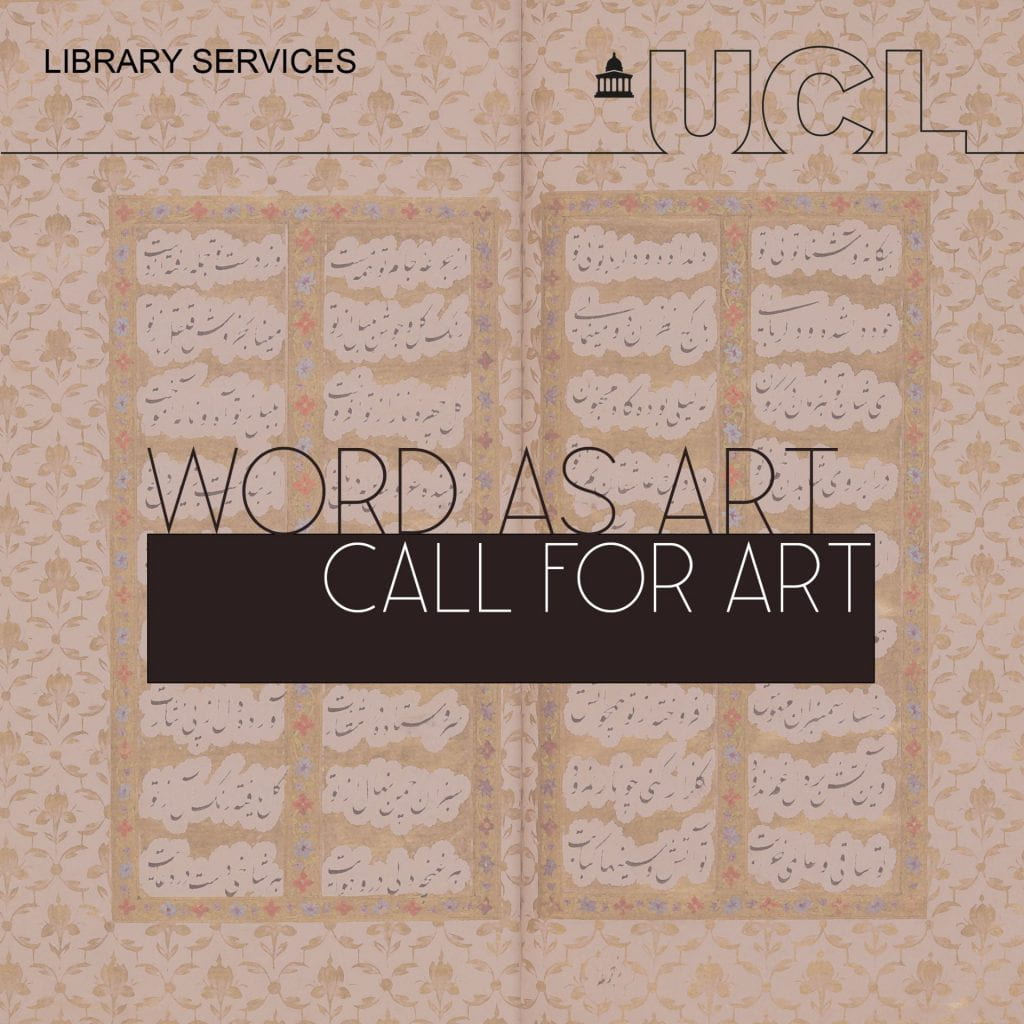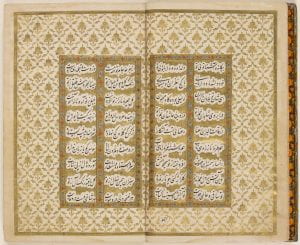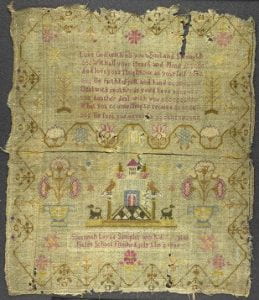This Friday, Saturday and Sunday, the Slade Small Press Project is opening its work to the public, alongside an exhibition on Friday afternoon from UCL Library Special Collections’ Small Press Collections. Events will take place at the Slade Research Centre, top floor, 16 Woburn Square, WC1H 0AB.
Staff and students from the Slade School of Fine Art, alongside invited artists, have created works on the theme of sound inspired by the material from Special Collections, as part of a term-long research project supporting UCL’s Connected Curriculum.
Participants in the project have seen and heard material from UCL’s collections by experimental and avant-garde writers, poets, artists, photographers, dancers and composers. These include graphic musical scores (to learn more about these, see for example this blogpost), and works by John Cage, Cornelius Cardew, Henri Chopin and performance poets. On Friday you might even pick up a specially-pressed vinyl record of the students’ work made in response to our collections.

Recordings from the avant-garde poet and musician, Henri Chopin UCL SMALL PRESS COLLECTIONS
Friday 9 March, 2-4.30pm, includes not only the library exhibition and listening booths, but talks from an artist, a poet, a film-maker and an art critic, discussing lullabies, the connection or not between grime music and concrete poetry, Daphne Oram (co-founder of the pioneering BBC Radiophonic Workshop), and dance notations by Jennifer Pike (held in Special Collections). 4.30pm till late will see the launch of an exhibition of work created during the Project, the launch of the students’ specially pressed vinyl record, and a specially editioned print in honour of the late Mark E Smith and his inspiration, Blast (copies of which are held in Special Collections). The evening programme also includes a series of live performances by Slade staff and students and invited artists. The Project exhibition and listening booths continue on Saturday 10 March, 1-5pm and Sunday 11 March, 1-4pm, with a further programme of live performances on the Saturday.
Events are free and open to the public. Full details in the Project brochure below or here.
Read more about the Subject Liaison Librarian Liz Lawes’ experience of running the project in Tabitha Tuckett and Elizabeth Lawes, ‘Object literacy at University College London Library Services’ in Art Libraries Journal vol.42 issue 2 (April 2017) pp.99-106.

UCL SMALL PRESS COLLECTIONS
********************************
The Small Press Project 2018
Slade Research Centre, Woburn Square
Friday 9th March
The Small Press Collections held by UCL Library Services Special Collections are a globally significant collection of Little Magazines, literary pamphlets, and counter-cultural newspapers produced as a result of the independent publishing scene of the mid 20th century to the present.
From the late 1950s experimental poets and visual artists took advantage of newly accessible printing techniques to self-publish, and distribute their work outside of mainstream literary journals or established gallery spaces. The collections focus on experimental text and image, visual and concrete poetry, the documentation of performance and sound poetry, and text works by artists.
The theme of Sound is in evidence throughout the collections in various manifestations: actual sound recordings, the visual scores of experimental composers, sound and performance poets, poetry and other texts to be read aloud. This year’s Small Press Project seeks to illuminate all these aspects.
The Small Press Project Event, also includes an exhibition of works and recordings made by the staff and students at the Slade School of Fine Art.
Schedule
2.10 Hannah Dargavel-Leafe
Introductions and welcome
2.15 Aura Satz
Aura Satz’ practice encompasses film, sound, performance and sculpture. She has made a body of works that look at key female figures largely excluded from mainstream historical discourse, in an ongoing engagement with the question of women’s contributions to labour, technology, scientific knowledge and electronic music. In her presentation she will give an overview of 3 projects made about women composers, including ‘Oramics’, an artist’s film made in homage to Daphne Oram.
2.45 Holly Pester
Holly Pester will present ‘A short talk on the process of recording lullabies and composing lines from an archive of efforts.’ As well as the talk (and possibly short reading of one of the poems), she will play extracts from her record Common Rest.
3.15 – 3.30 Tea & Coffee
3.30 Holly Antrum
For her presentation, Holly Antrum will introduce an artistic interest in the original items and materials that went into Computer Dances by artist Jennifer Pike (1919 – 2016), as a subsequent tool for inter-generational collaboration and intervention. Jennifer Pike produced the ‘Computer Dances’ and other works within and around a productive, shared domestic studio, printing and publishing space wherein she was the oft-collaborator, and also marriage partner of Bob Cobbing (1920-2002). Computer Dances compiles Pike’s abstract notations for dance and performance: they were made in her 70’s, and she created them stepping into digital working, through scans and digital drawing using a simple early Sketch-Up programme. Holly will explore how arriving at these drawings occurred through being in Pike’s home and studio and how this sonically entered her 16mm/HD film, titled Catalogue (2012-14). Excerpts will screened from the film (19 minutes).
4.00 Jonathan P Watts
Jonathan P Watts will present ‘g, g, g, grime & kon kon kon konkrete poetry’
There is no actual relation between concrete poetry and grime, but the mix and blend might open up affinities. For example, by concentrating on the physical substance of language, concrete poetry can, to echo Bob Cobbing, help us consider how the microphone and the tape recorder extends the human voice, teaching the human new tricks of rhythm and tone, power and subtlety’. Grime, the Lewisham MC Novelist recently explained, is ‘an unorthodox, rebellious sound that represents madness from the hood, the streets’. Concrete poetry is now mostly in the academies, but it was unorthodox in its time. As grime has formalised into a mainstream genre so, arguably, its unorthodox, experimental beginnings have been forgotten. Wiley, writing in his recent autobiography, Eskiboy, reminds us: ‘I’ve got a lot of songs that I’ve never released which are just trying different things with the mic, very experimental kind of stuff. I’ve had ideas for whole songs just using the mic, my voice and nothing else.’ From Flirta D’s ‘splatterisms’ to Flow Dan’s New Age Synchronised Avengers, D Double E’s ‘blukuuus’ to God’s Gift’s rhyming gunshots, this talk will not place grime in the service of concrete poetry.
4.30 – 8.00 Private View for the Small Press Project Exhibition
The evening will feature live performances, curated by Hannah Dargavel-Leafe, Honorary Research Associate, by invited artists and students and staff from Slade School of Fine Art. We will also launch a special edition and a 10” vinyl publication produced by students as part of the project.
Biographies
Holly Antrum (b. London 1983) is an artist filmmaker based in London, and a current participant of the Acme Fire Station Work-Live residency in Bow. She works with 16mm, paper and digital mediums, and often in collaborative processes and study of practice with other artists and writers. She is interested in the moment of our accustomisation to celluloid-as-digital-material, and in a material moment of being at once archived and removed from the original and native aesthetic. Through her films she utilises the poetics of layered film processes, presence, communication and templates of speech, memory and in-situ sound. Recent projects include EIDOLON(2017) a film commissioned by International Literature Showcase with poetry by Sandeep Parmar. The new work was screened alongside artist-selected archival works within the Cinenova collection at The Showroom (February 2018). Solo gallery installations include Catalogue at Edinburgh Sculpture Workshop, Edinburgh (2016) and A Diffuse Citizen at Grand Union, Birmingham (2014). Her work has also been screened in galleries internationally. Holly Antrum earned her Masters in Printmaking at the Royal College of Art, London (2011), and her BA Fine Art Painting at Wimbledon School of Art, London (2005). A copy of Computer Dances (first published by Writer’s Forum in 1995) is also held in the UCL Special Collections.
Jonathan P. Watts is a contemporary art critic and occasional curator. He is a visiting lecturer in Critical and Historical Studies at the Royal College of Art, London. Writing by Jonathan has appeared in frieze, Art Monthly and Artforum. His review of Wiley’s recent autobiography Eskiboy appeared in the Times Literary Supplement this week. As ‘helter helter’, he makes performances that respond to aspects of instrumental grime music.
Holly Pester is a poet and Lecturer in Poetry and Performance at University of Essex. Her work has been situated as recordings, print, sound installation and live readings at international venues and esoteric spaces. Her most recent work, Common Rest was an album of collaborative Sound Poetry and accompanying poetry pamphlet. More info can be found at hollypester.com
Aura Satz has performed, exhibited and screened her work nationally and internationally, including Tate Modern, Tate Britain, the Hayward Gallery, Barbican Art Gallery, ICA, the Wellcome Collection, BFI Southbank, Whitechapel Gallery, (London); Oberhausen Short Film Festival (Oberhausen); the Rotterdam Film Festival (Rotterdam); the New York Film Festival (NY); Anthology Film Archives (NY); Gertrude Contemporary (Melbourne); De Appel Art Centre (Amsterdam); AV festival (Newcastle); Baltic Centre for Contemporary Art (Gateshead); Irish Museum of Modern Art (Dublin); InterCommunication Centre (Tokyo); Lentos Museum (Linz); and The Sydney Biennale (Sydney). Recent solo shows include John Hansard Gallery (Southampton); Dallas Contemporary (Texas); Gallery 44 (Toronto); Tyneside Cinema Gallery (Newcastle); George Eastman House (Rochester NY); Fridman Gallery (NY). In 2012, she was shortlisted for the Samsung Art+ Award and the Jarman Award. She is a Reader and Tutor at the Royal College of Art, London. www.iamanagram.com
Hannah Dargavel-Leafe (born 1987, London) graduated with an MA from the Slade School of Fine Art in 2016 and Manchester School of Art with a BA in 2010. She has exhibited at The International 3 in Manchester, Bluecoat in Liverpool, and at ICA London. In 2016 she was in residence at the East Tower at Television Centre, White City and worked collaboratively with the artist Jack West. She was a featured artist in Ambit Magazine.
Dargavel-Leafe runs The Loop, an ongoing research project through symposiums, exhibitions and publishing. She is an associate artist with The International 3.
Small Press Project is organised by:
Liz Lawes, Subject Liaison Librarian for Fine Art, UCL Library Services
Lesley Sharpe, Holding Page & Teaching Fellow, Slade School of Fine Art;
Hannah Dargavel-Leafe, Honorary Research Associate, Slade School of Fine Art;
Sarah Pickering, artist & Teaching Fellow, Slade School of Fine Art
The Small Press Project is generously supported by the Teaching Initiatve Fund, IAS and the Dean’s Strategic Award.
**********************
 Close
Close





















